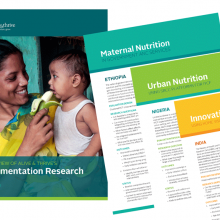Journal article
Dec 08 2020

Mistakes from the HIV pandemic should inform the COVID-19 response for maternal and newborn care (Gribble, K., 2020. International Breastfeeding Journal)
During the COVID-19 pandemic, policy makers and practitioners must learn from mistakes made during the HIV pandemic, when breastfeeding was undermined through isolating infants from their mothers, and formula feeding resulted in more infant deaths than the disease.
Brief
Dec 03 2020

Policy Whitepaper: Workplace lactation support programs in Viet Nam
Breastfeeding-friendly maternity protection and practices in the workplace must be prioritized to increase breastfeeding rates and improve the health, nutrition, and wellbeing of mothers, children, and society.
Brief, Handout
Oct 28 2020

An overview of Alive & Thrive's implementation research
Alive & Thrive's implementation research spans its program areas, seeking to answer "how" to implement effective interventions and policies. Active studies are detailed in the attached documents.
Journal article
Jul 16 2020

National nutrition strategies that focus on maternal, infant, and young child nutrition in Southeast Asia do not consistently align with regional and international recommendations (Maternal & Child Nutrition, 2020)
This study examines the consistency of national nutrition strategies and action plans (NNS) focusing on maternal, infant, and young child nutrition in Southeast Asia with international recommendations.
Journal article
Jul 16 2020

The Role of the Opinion Leader Research process in informing policy making for improved nutrition: Experience and lessons learned in Southeast Asia (Weissman, A., 2020. Current Developments in Nutrition)
This article shares lessons learned from using Opinion Leader Research (OLR), used here as an advocacy tool to strengthen policymaking for MIYCN.
Journal article
Jul 16 2020

Long-term consequences of stunting in early life (Dewey, K., 2011. Maternal & Child Nutrition)
This review summarizes the impact of stunting, highlighting the growing evidence of the connections between slow height growth in young children and impaired health, education, and economic performance later in life.

